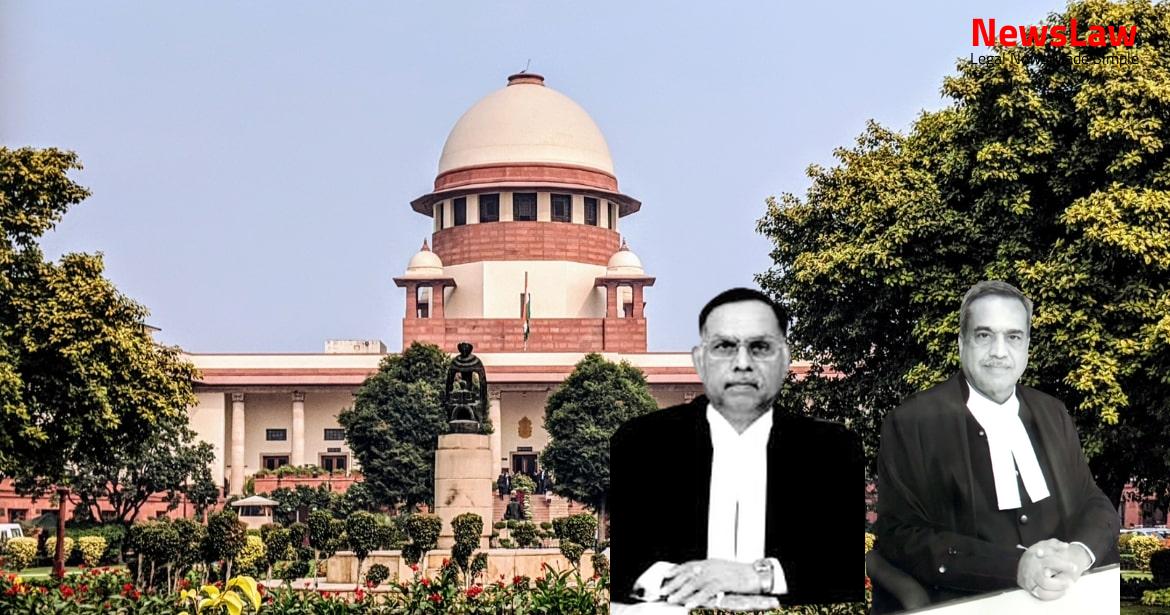Explore a detailed legal analysis of penalty imposition in a significant stamp duty case. The court’s examination of the Collector’s authority to impose penalties under the Indian Stamp Act, 1899 provides insights into the fair and reasonable exercise of discretion. Understanding the nuances of penalty imposition is crucial in ensuring just outcomes in legal matters.
Facts
- Single Judge upheld the order of the Collector regarding deficiency in stamp duty and ten times penalty
- Limited notice issued on the quantum of penalty imposed by the Collector (Stamps)
- Division Bench dismissed the writ appeal as not maintainable
- Brief facts of the case leading to the appeals stated
- Appellant challenges the judgments of the Single Judge and Division Bench
- Late Shri H.C. Dhanda received a free gift of land measuring 108,900 sq.ft. in 1946.
- Collector found deficit stamp duty of Rs.1,28,09,700/- and imposed a penalty of Rs.12,80,97,000/-.
- Board of Revenue upheld the order of the Collector regarding stamp duty and penalty.
- Late Shri H.C. Dhanda executed his last Will in 2002 appointing trustees.
- A meeting of the Board of Trustees was held in 2005 regarding transfer and vesting of properties.
- Writ Petition filed in the High Court challenging the orders of the Board of Revenue and Collector.
- Notice issued by the Collector of Stamps regarding proper stamp duty on Deed of Assent.
- Collector considered the Deed of Assent as a gift deed and imposed additional stamp duty and penalty.
- Late Shri H.C. Dhanda passed away in 2003, putting his properties in a Trust according to his Will.
- Further notice issued for deficit stamp duty and penalty on the document of 2005.
- Trust appeared before the Collector of Stamps and filed objections.
- An SLP was filed, then withdrawn, and a writ appeal was filed in the High Court.
- Writ appeal was dismissed by the Division Bench as not maintainable.
Also Read: Transfer of Writ Petitions for Chartered Accountants’ Tax Audit Guidelines
Issue
- The only question to be determined in these appeals is whether the imposition of ten times penalty by the Collector of Stamps under Section 40 of the Indian Stamp Act, 1899 was validly imposed or not.
Also Read: Analyzing Interference with Acquittal in Legal Conviction Case
Arguments
- The appellant, in this case, did not engage in any dishonest conduct.
- The Deed of Assent was executed in good faith and there was no deficiency in stamp duty.
- The penalty of ten times imposed on the appellant by the Collector of Stamps lacks justification as no reason was provided for such a high penalty.
- It is argued that the Collector of Stamps did not exercise fair and reasonable jurisdiction in this matter.
- The document in question is not a Gift Deed but is related to Sections 331 and 332 of the Indian Succession Act, 1925.
- The penalty imposed on the appellant is deemed as illegal by the counsel for the appellant.
- Shri Mehta referred to the order of Board of Revenue upholding imposition of ten times penalty for executing Deed of Assent with intentional suppression of facts leading to loss of stamp duty.
- Shri Tushar Mehta, the Solicitor General, argued that the nature of the document was determined to be a gift, justifying the Collector’s decision to impose deficiency in stamp duty and ten times penalty.
- It was contended that there was a clear intention on the appellant’s part to evade payment of stamp duty, warranting the imposition of the penalty.
Also Read: Judicial Review on Sentence and Compensation in Criminal Case
Analysis
- The discretion to impose a penalty of ten times the duty is not to be exercised arbitrarily but in a rational and fair manner.
- Imposition of the extreme penalty should not be solely based on the evasion of duty; other factors like intent and conduct should be considered.
- The statute grants the Collector the authority to impose a penalty not exceeding ten times, emphasizing the need for reasonable exercise of discretion.
- The Collector’s reason for imposing the maximum penalty was the party’s intention to evade duty, without proof of dishonesty or contumacious behavior.
- The discretion granted to the Collector allows for a case-specific analysis to determine the extent of penalty, considering relevant factors like intent and conduct.
- Section 35 of the Stamp Act states that instruments not duly stamped are inadmissible in evidence unless the required duty is paid.
- If the Collector deems an instrument chargeable with duty and not duly stamped, he can demand the proper duty along with a penalty.
- The penalty can be five rupees or up to ten times the amount of the deficient duty.
- Section 40(1)(b) reiterates the Collector’s authority to require payment of proper duty and penalty.
- Section 38(1) and Section 39(1)(b) also mention the possibility of a penalty up to ten times the deficient duty.
- In cases where the penalty amount exceeds five rupees, the Collector has the discretion to refund any excess amount over five rupees.
- Legislative intent as per Sections 33, 35, 38, and 39 shows that the Collector can reduce penalties for instruments not duly stamped.
- The Collector has the power to require the person concerned to pay the proper duty along with a penalty which should be determined considering all aspects involved, such as fraud or deceit to deprive the Revenue or undue enrichment.
- The extent of the penalty under Section 40(1)(b) should be decided based on relevant factors, including the reason for the fraud or deceit.
- Referring to the case of Peteti Subba Rao vs Anumala S. Narendra, it was emphasized that the Collector is not bound to impose the maximum penalty as a routine, and must consider various aspects, including the financial position of the person concerned.
- In the case of Gangtappa and another vs Fakkirappa, it was clarified that the legislature did not intend for a penalty to be imposed at the maximum rate of ten times in all cases.
- The reason for imposing the penalty was the intention to evade stamp duty by describing the document as Deed of Assent.
- Both the Collector and the High Court agreed that the penalty was justified in this case.
- Despite the intention to evade stamp duty, it was determined that the penalty imposed was not excessively harsh.
- After considering the facts and circumstances presented by the Collector of Stamps, it was concluded that the penalty was not unreasonably high.
Decision
- The appeals were allowed and the order of the Collector of Stamps was modified.
- The penalty of ten times Rs.12,80,97,000 was changed to five times penalty of Rs.6,40,48,500.
- The penalty imposed was reduced to half, i.e., five times the deficiency in stamp duty.
- The appeals were partly allowed considering all facts and circumstances of the case.
Case Title: TRUSTEES OF H.C.DHANDA TRUST Vs. THE STATE OF MADHYA PRADESH (2020 INSC 551)
Case Number: C.A. No.-003195-003196 / 2020



